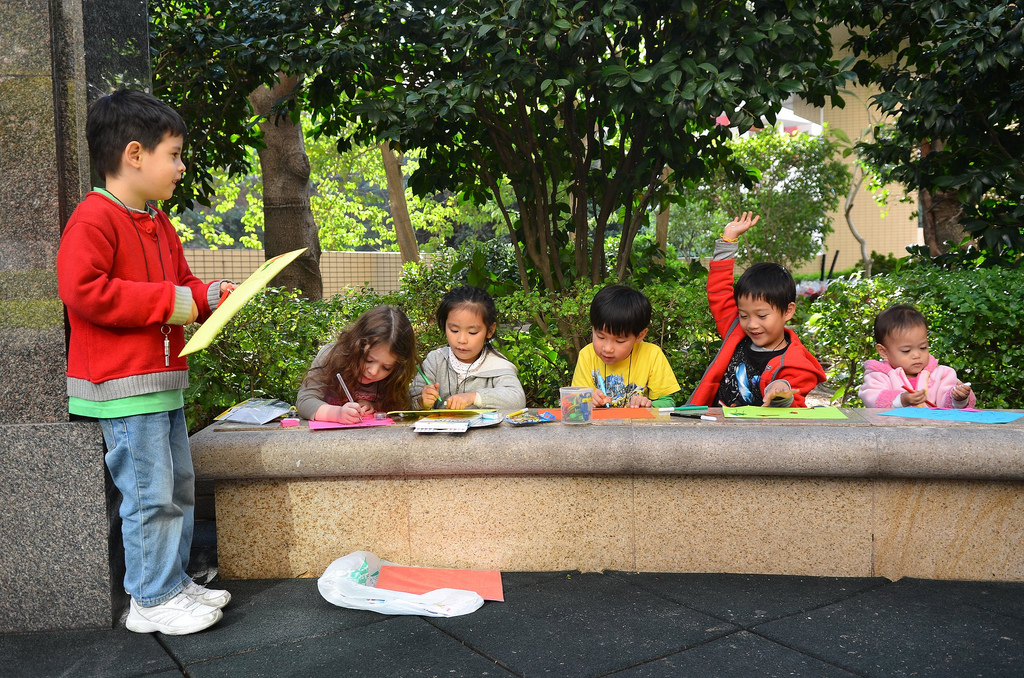 Psychology
Psychology
Children Prefer the Real Thing to Pretending
Playing can be seen as the "gym" of life for children. Therefore we encourage them to pretend-play the real-life ahead of them. However, given the choice, wouldn't them jump head in into the real thing?

Pretend-play is a favorite pastime for American children. They mentally transform the here and now, preparing pretend meals in toy kitchens, frolicking around on fake horses, and feeding baby dolls with plastic bottles. By age 4, children spend approximately 20% of their waking hours engaged in such play, and yet many of their pretend activities could be done for real. Indeed, several popular pretend activities, such as preparing food and caring for babies, are done for real every day by many children around the world.
We wondered: when given the choice, do American children prefer pretend-play activities to their real-world counterparts? For example, would they rather cut wooden vegetables held together with Velcro using a wooden toy knife, or would they rather cut fresh vegetables with a real knife? Our research, recently published in Developmental Science, begins to address this question.
We asked 100 preschoolers (ages 3 to 6) to choose between pretend and real versions of nine different activities (e.g., riding a horse, cutting vegetables, washing dishes, and fishing) and justify their choices. We found that although 3-year-olds were 50-50, by age 4, children strongly preferred real activities. Of the nine activities, there was not a single one that the whole sample of children preferred to pretend rather than really do. Children told us that they preferred real activities because of their functionality and utility: doing real things leads to real-world outcomes, and they like that. For example, to justify her choice to really feed a baby, a child said, "We could learn how to feed babies in case my mom becomes a babysitter and I help". In contrast, on those occasions when pretend choices were selected, the most common reasons were ability, avoidance, and permission. Children expressed wanting to avoid a negative outcome they feared could result from the real activity, or appealed to their own perceived lack of ability. For example, one child justified his choice to pretend to rather than really fish with, "Because I might pull up a shark or a big dangerous other thing".
These findings are interesting to consider with regard to current preschool curricula. Opportunities to engage in real activities differ widely across preschool classrooms in the United States. Children in conventional preschools are often encouraged to pretend, and are believed to learn various skills through these pretend engagements. In contrast, children in Montessori preschools are not encouraged to pretend, something for which Montessori education is commonly criticized. Instead, through Montessori's practical life exercises, children engage in real activities that other children might only pretend to do (e.g., cutting fruits and vegetables, washing tables, baking biscuits, and so on). Perhaps surprisingly, children's responses in this study suggest that they would like to have more opportunities for real engagements.
In sum, we have found that even though they are at an age where pretending is a popular activity, American children express a desire to participate in the real world. They want to help their parents wash dishes and bake cookies, and they want to really go fishing and feed babies. These findings challenge the Western assumption that play is the superlative activity for children. It appears that, to some extent, children view pretending as a substitute for activities that they would rather do for real.
Original Article:
Taggart J, Heise M, Lillard A. The real thing: preschoolers prefer actual activities to pretend ones. Dev Sci. 2017:e12582. doi:10.1111/desc.12582.Next read: How nanosized shrapnel from exploding fungal cells may impact us: from allergies to cloud formation by Michael J. Lawler
Edited by:
Massimo Caine , Founder and Director
We thought you might like
“Who is really, really smart?” Early differences in boys’ and girls’ assumptions about intelligence
Apr 6, 2017 in Psychology | 3 min read by Lin BianShort bursts of exercise improve brain function
Jan 18, 2018 in Psychology | 3 min read by David MoreauCollateral damage: antibiotics disrupt the balance in the gut
Jun 2, 2016 in Microbiology | 3.5 min read by Katri KorpelaInvisible allies for healthy juvenile growth
Oct 12, 2016 in Microbiology | 4 min read by Martin SchwarzerMore from Psychology
Sharing a political ideology predicts more similar brain activity
Sep 1, 2023 in Psychology | 3.5 min read by Daantje de Bruin , Oriel FeldmanHallHow do people see, simplify, and solve problems?
Aug 25, 2023 in Psychology | 3.5 min read by Mark HoWomen are human too, but not according to the internet
Jul 21, 2023 in Psychology | 4 min read by April BaileyDeaf to arguments? How conspiracy beliefs shape opposition to wind farms
Jun 12, 2023 in Psychology | 3 min read by Kevin WinterCan Training Make Policing Fairer and More Effective?
May 22, 2023 in Psychology | 3 min read by David Weisburd , Cody TelepEditor's picks
Trending now
Popular topics


